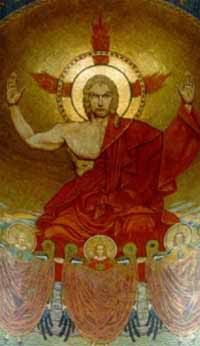Proclaim

The Pope here advises Priests. A post-Christian or never-Christian world puts us in a position much like the early Church. Tiny seeds that may be asked what is the reason for your Hope.
The tough part of course, is that you will never be asked about your Hope, unless it is displayed so as to prompt the question. Long standing patience.
And perhaps you will never be asked at all. Nevertheless, the witness is real and effective, the results of which may only be known in the hereafter, which is always closer at hand than it may seem.
This as I look back, is where the gift was given to me. So many dear people long gone who looked like Hope. I don't remember asking any of them specifically why, but watched closely. That cloud of witnesses mentioned in last Sunday's Gospel. They proclaimed through living. And now gone, proclaim through memory. The real salt of the earth.
A uniform world no longer exists. All the other continents, the other religions, the other ways of living human life are present especially in the West. We are living a permanent encounter where we resemble the ancient Church because she experienced the same situation.
In his First Letter, St Peter said: "Always be prepared to make a defence to anyone who calls you to account for the hope that is in you" (3:15). Thus, he formulated for the ordinary person of that time, for the ordinary Christian, the need to combine proclamation and dialogue. He did not say formally: "Proclaim the Gospel to everyone". He said: "You must be able, ready, to account for the hope that is in you". I think that this is the necessary synthesis between dialogue and proclamation. The first point is that the reason for our hope must be ever present within us. We must be people who live faith and think faith, people with an inner knowledge of it. So it is that faith becomes reason within us, it becomes reasonable.
All this makes us capable, first of all, of truly living as the neighbours of non-Christians -- here, mainly Orthodox Christians, Protestants and also exponents of other religions, Muslims and others. The first aspect is to live beside them, recognizing with them their neighbour, our neighbour; thus, living love of neighbour on the front line as an expression of our faith. I think that this is already a very powerful witness and also a form of proclamation: truly living love of neighbour with these others, recognizing the latter, recognizing them as our neighbour so that they can see: this "love of neighbour" is for me. If this happens, we will be able to more easily present the source of our behaviour, in other words, that love of neighbour is an expression of our faith. Thus, our dialogue cannot move on suddenly to the great mysteries of faith, although Muslims have a certain knowledge of Christ that denies his divinity but at least recognizes him as a great Prophet. They love Our Lady. These are consequently elements that we have in common, even in faith, and are starting points for dialogue. A perception of fundamental understanding on the values we should live is practical, feasible and above all necessary. Here too, we have a treasure in common because Muslims come from the religion of Abraham, reinterpreted and relived in ways to be studied and to which we should finally respond. Yet, the great substantial experience of the Ten Commandments is present and this seems to me a point that requires further investigation. Moving on to the great mysteries seems to me to be moving to a level that is far from easy and impossible to attain at large meetings. Perhaps the seed should enter hearts, so that here and there the response of faith in a more specific dialogue may mature. But what we can and must do is to seek a consensus on the fundamental values expressed in the Ten Commandments, summed up in love of neighbour and love of God, and which can thus be interpreted in the various life contexts. We are at least on a common journey towards the God of Abraham, Isaac and Jacob, the God who is ultimately the God with the human face, the God present in Jesus Christ. But if the latter step is to be made in intimate, personal encounters or small groups, the journey towards this God, from which derives these values that make life in common possible, I think this is feasible also at larger meetings. As a result, in my opinion a humble, patient form of proclamation should be undertaken here, which awaits but already realizes our life in accordance with knowledge enlightened by God.




0 Comments:
Post a Comment
<< Home